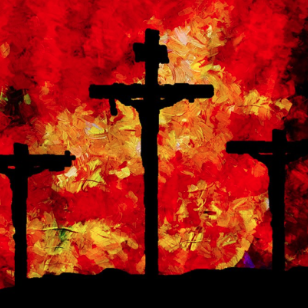The Passion of Jesus as told in John’s Gospel presents a host of characters playing seemingly small roles as the narrative sweeps them up into the grand story of salvation.
Judas’ intimate knowledge about Jesus makes him a well-suited betrayer. Judas knows enough about Jesus to lead the soldiers to the place in the garden where he could be found that night.
Loyalty or love energizes Peter to defend Jesus with a sword as he is arrested, but a few paragraphs later Peter won’t even admit to knowing who Jesus is.
Annas and Caiaphas, the religious leaders, identify Jesus as one whose teaching has broken norms that must be protected.
Pilate, the political leader, seeks to find a space between multiple constituencies, while preserving order. His perfunctory examination of Jesus takes a dramatic turn as Pilate gives voice to the deepest of questions: What is truth? While Pilate finds Jesus innocent, the crowd instead insists on the release of the guilty bandit Barabbas. When the mob is still not satisfied, Pilate eventually gives way to expedience, the desire for order taking priority over everything else, including justice, righteousness and truth. It’s the way empires are sustained.
Through it all, Jesus remains in control, committed to the path set before him. He willingly gives himself up in the garden. He heals the soldier struck by Peter’s sword. He stands resolutely before Annas and Caiaphas, confidently responding to allegations. He defiantly engages an increasingly exasperated Pilate. When Pilate decides that sacrificing one person is a worthy exchange for a few moments of quiet, Jesus carries his own cross to Golgotha.
As he is lifted up, more characters present themselves. Bearing witness near the cross are his mother, his mother’s sister and Mary Magdalene. They look on with measures of sorrow and compassion. The beloved disciple is also there, standing beside Jesus’ mother. From the cross, still directing the action, Jesus graciously connects these two as a new family. Jesus then speaks necessary words of Scripture, “I am thirsty,” before bringing his life to an end with a final direction: “It is finished.”
Joseph of Arimathea arrives to care for the body of Jesus. While he is described as a “secret disciple,” Joseph steps forward for this task when the more notable disciples have all slipped away in shame or fear. Joseph is accompanied by Nicodemus — whom we last saw in John 3, speaking with Jesus in the night. The death of Jesus pulls Joseph and Nicodemus from the hidden margins of faith for the holy work of preparing his body for burial and laying it in the fresh tomb.
We can ponder the reactions, responses, and motivations of the characters in these chapters from John’s Gospel, even as we measure our own lives since last Good Friday. We can notice the active betrayal, the fierce faith, the persistent denial, the wavering authorities, the quiet witness and the tender care that swirl in this story as Jesus nonetheless moves forward with his life’s purpose. As we hear these familiar words in this unfamiliar time, the text invites us to consider what we have done and what we have left undone, individually and collectively, in a year marked by all sorts of struggle, challenge and heartbreak. How has our faith been formed, strengthened, weakened? What’s been betrayed, denied, lost? Has anything been gained? What’s been kept secret, hidden? Amid our own reflections and confessions, as we again find our place within the Passion, Jesus is undeterred, continuing to move in our midst with bountiful mercy and boundless love, carrying us through the sorrow of Good Friday, while keeping before us the hope of Easter.
JOHN WURSTER is pastor of St. Philip Presbyterian Church in Houston.












No comments:
Post a Comment